Iran media say France detained dual national over pro-Palestinian posts
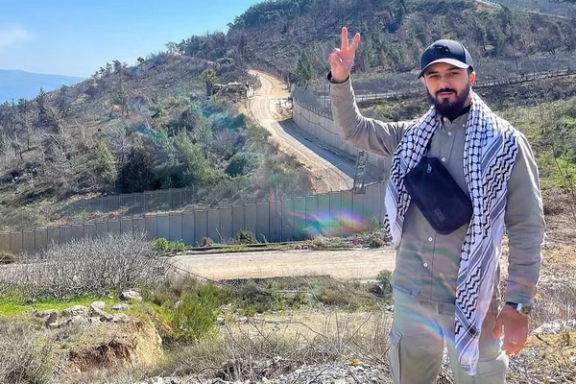
French authorities have arrested a dual Iranian-French national in Paris for expressing support for Palestine, Iranian state media reported on Wednesday.

French authorities have arrested a dual Iranian-French national in Paris for expressing support for Palestine, Iranian state media reported on Wednesday.
Mizan News Agency, affiliated with Iran’s judiciary, reported that Shahin Hazamy was detained by French security forces on Tuesday. The outlet described him as an independent journalist and said the arrest stemmed from his support for Palestine, without citing French legal charges.
French magazine Le Point confirmed through Hazamy’s lawyer that the arrest was based on accusations of “apologie du terrorisme,” a criminal charge under French law covering praise of terrorist acts. Hazamy remains in temporary detention while the case is under review by investigating judges.
Posts on Hazamy’s Instagram account show support for Hezbollah and Palestinian factions backed by Tehran, as well as images taken during recent visits to Lebanon. He also voiced solidarity with Mahdieh Esfandiari, a 39-year-old Iranian translator living in Lyon who has been held since early March under similar charges.
According to Le Point, Esfandiari is accused of publishing Telegram posts in support of the October 7 Hamas attack on Israel, which Israeli officials say killed over 1,200 mostly civilians.
Iran’s foreign ministry has criticized both arrests, demanding explanations and consular access. Spokesman Esmail Baghaei said earlier in April that the detentions raised serious concerns over the rights of Iranian nationals in France.
France, meanwhile, says Iran detains French citizens as leverage in diplomatic disputes. Foreign Minister Jean-Noël Barrot urged French nationals not to travel to Iran, citing the risk of arbitrary arrest.

Iran’s ambassador to Lebanon, Mojtaba Amani, said the decision on whether Hezbollah should disarm rests with the Lebanese government, days after he publicly criticized international disarmament efforts.
“We are committed to what the Lebanese agree upon,” Amani said in an interview with Lebanon’s Al Jadeed TV on Wednesday in a reversal of remarks made last week which caused him to be summoned by Lebanon's Foreign Ministry.
Last week Amani warned against what he called a disarmament “conspiracy,” saying on X: “We in the Islamic Republic of Iran understand the danger of this conspiracy and its threat to the security of the region’s peoples.
"We warn others against falling into the enemy's trap. Preserving deterrent capability is the first line of defense for sovereignty and independence and must not be compromised.”
Amani also confirmed he had not attended the ministry's summons. “I was informed of the Foreign Ministry’s request regarding my posts about weapons, but I apologized for not attending,” he said in Al Jadeed TV interview. “No new date has been set.”
His comments come after Lebanese President Joseph Aoun said last week that he hopes Hezbollah, designated as a terrorist organization by countries including the US, UK and EU, can be disarmed or brought under state control this year, following what he described as a significant weakening of the group during Israel’s recent military campaign.
The Iran-backed group is currently in the midst of a fragile US and France-brokered ceasefire with Israel which began in November. Both sides report dozens of breaches.
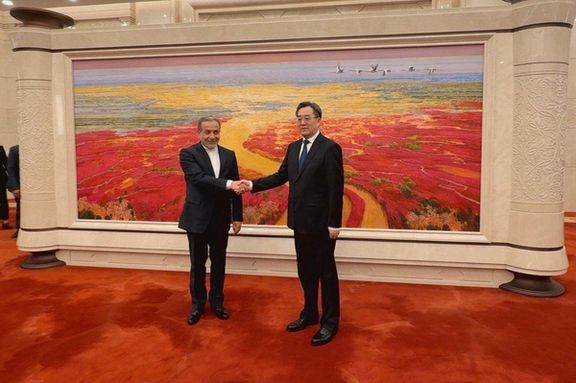
Iran briefed China on Tehran’s negotiations with Washington and called for accelerated implementation of the 25-year strategic cooperation pact, Iranian media reported Wednesday.
“The Islamic Republic is proceeding with diplomacy seriously and in good faith, despite bitter past experiences,” Foreign Minister Abbas Araghchi said during a meeting with China's First Vice Premier Ding Xuexiang on Wednesday, held at the Great Hall of the People in Beijing.
Araghchi is to hold a third round of talks with US envoy Steve Witkoff on Saturday.
The Iranian foreign minister and his Chinese hosts also discussed accelerating the implementation of the 25-year agreement, first signed in 2021, which envisions Chinese investment in Iran’s energy and infrastructure sectors in exchange for long-term energy supply commitments.
However, its implementation has lagged amid sanctions, Chinese investments in Iran so far meager, and the exact details of which remain top secret. Projects like the South Pars gas field development and the Gohardasht Steel project have encountered hurdles, with Chinese firms retracting or terminating their investments.
The comprehensive strategic partnership announced in 2016 saw the two countries plan to increase trade to $600 billion by 2026 while in 2023, according to the International Monetary Fund’s Direction of Trade Statistics dataset, the volume of trade reached just $12.5 billion.
During the Wednesday meeting in Beijing, the Chinese vice premier called the relationship with Iran “a product of mutual trust and shared interests,” and said China would work to expand coordination across regional and international platforms.
Foreign Ministry spokesman Esmaeil Baghaei said on X on Tuesday, "With a shared outlook on many international issues, and by relying on mutual trust and respect, Iran and China are resolutely advancing their efforts to safeguard the mutual interests of their nations."
Upon his arrival in China, Araghchi described China and Russia as “strategic partners and close friends who have supported Tehran in difficult times.”
He said Iran would maintain close consultation with China moving forward.
“We will definitely continue our consultations with China as a member of the Security Council, a member of the IAEA Board of Governors, and a country with experience in the nuclear issue,” Araghchi added.
Earlier, a source familiar with the matter told Iran International that Iran’s Supreme Leader delivered a message through Araghchi to Chinese President Xi Jinping, reaffirming Iran’s long-term commitment to the strategic partnership regardless of the outcome of the nuclear negotiations.
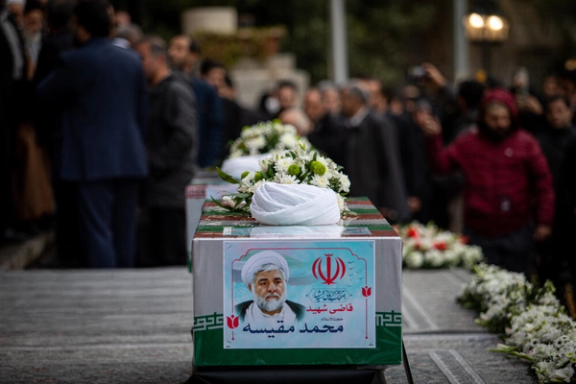
The man who shot dead two Iranian Supreme Court judges in a rare assassination of top officials in January has been identified as Farshid Asadi, a 31-year-old court service aide, a source familiar with the matter told Iran International.
Asadi, originally from Razan in Iran's Western Hamedan Province, worked at the Supreme Court in Tehran providing refreshments to judges and staff, said the source who spoke on condition of anonymity due to the sensitivity of the matter.
The assailant was initially assigned to the court’s fifth floor but was later relocated to the first floor after Judge Mohammad Moghiseh moved his office there.
On January 18, veteran judges Moghiseh and Ali Razini were shot and killed inside the Supreme Court building in central Tehran. The incident shocked the judiciary and remains largely unexplained by authorities.
The two clerics were central figures in Iran's theocratic establishment who had handed down death sentences and other harsh punishments on dissidents for decades. Supreme Leader Ali Khamenei led their funerals.
Their deaths marked a rare attack on senior officials as discontent over political repression and economic malaise festers in Iran.
The source told Iran International that Asadi first entered the room of a security guard and injured him before proceeding to the judges’ office. There, he shot Razini once, killing him instantly. As Moghiseh attempted to flee, Asadi fired again, striking him in the hand and then fatally in the back, piercing his heart.
Asadi, the source added, also intended to target another senior judicial figure, Mahmoud Toliyat, a former Revolutionary Court judge, but changed his mind for unknown reasons. He then turned the weapon on himself and died at the scene.
The full name, age and intended third target of the attacker was not previously reported.
Initial reporting by state-affiliated media suggested the attacker may have been an outsider or “armed infiltrator.” However, conflicting accounts followed, with judiciary-linked outlets later confirming the assailant was employed inside the court complex.
Following the shooting, several of Asadi’s relatives—including his father, uncle, maternal uncle, and two female cousins—were detained at different times by Iran’s Ministry of Intelligence, the source told Iran International.
It remains unclear how many are still in custody.
Separately, former political prisoner Bijan Kazemi has been held incommunicado for over 100 days in connection with the case. Authorities are reportedly attempting to extract a confession linking Kazemi to the firearm used in the attack. Asadi’s father is under pressure to admit involvement, the source added.
Judges Razini and Moghiseh, both clerics, were widely known for their roles in high-profile security cases and for issuing harsh sentences against political dissidents.
They were also involved in the mass execution of political prisoners in 1988, a chapter heavily criticized by human rights organizations.
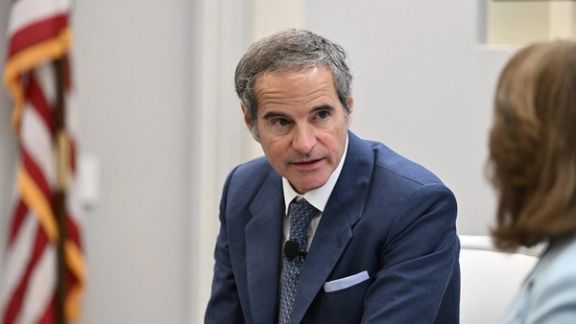
Iran has enough enriched uranium to produce several nuclear warheads and could do so within months, International Atomic Energy Agency Director General Rafael Grossi said Tuesday at the Council on Foreign Relations.
“Iran is not far from having a nuclear problem. They don’t have it, we know it,” Grossi said. “But the material for it already, it’s already there. To make a few warheads.”
He added that Iran had previously “conducted research and even testing some of the necessary elements for (a) nuclear device,” and that the IAEA lacks “full confidence that they have disappeared completely.”
While stressing the technical distinction between capability and possession, Grossi warned that the timeline is narrowing: “It would be a matter of months, not years."
The IAEA continues inspections in Iran, but Grossi described the current level of access as falling short. “I would say insufficient ... degree of visibility as we see it necessary.”
Talks between the US and Iran are ongoing, with Grossi calling the moment “fraught with opportunity, but of course pretty sensitive, if not dangerous.”
He referred to the unprecedented nature of the engagement, saying, “We see Iran and the United States talking directly in a way that had never happened before.”
Grossi said the IAEA lacks adequate visibility and called the current US-Iran talks “a moment of huge, huge, huge responsibility for everybody.”
Key technical issues, including uranium enrichment and potential weaponization, are central to the discussions. “It is obvious ... that the enrichment chapter is a very big chapter...and the weaponization chapter is another very important part of that conversation,” said the IAEA chief.
Grossi said China had expressed clear opposition to a nuclear-armed Iran during his recent meetings in Beijing, which he called, "a very firm commitment ... that we should not have an Iran armed with nuclear weapons.”
He concluded that verifying any future agreement would remain the IAEA’s domain. “We are the ones that are able—the only ones that are able—to say Iran has so much of this, so much of that.”
Grossi visited Tehran last week and held talks with senior Iranian officials ahead of the second round of US-Iran diplomacy in Rome.
US President Donald Trump has threatened to bomb Iran if the negotiations fail.
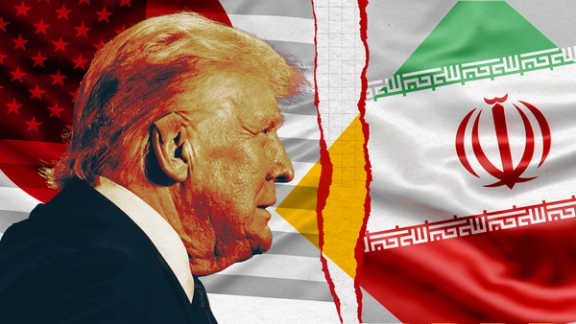
Debate is growing in Washington over talks with Iran, with hawkish Republicans urging against appeasing Iran's theocratic rulers but some observers saying the mercurial president might have a historic shot at clinching a deal with Tehran.
The debate has exposed unexpected fractures: US President Donald Trump’s own allies are split, while some longtime democratic critics of the president have cautiously praised his approach—highlighting the unpredictability of the current diplomatic moment.
Robert Malley, the former Biden administration Iran envoy who was sidelined for allegedly mishandling classified information, told The Free Beacon he is “optimistic” about Trump’s upcoming nuclear talks with Iran.
Meanwhile, traditional opponents of diplomacy with Iran are sounding alarms. Republican Senator Ted Cruz posted on X that “anyone urging Trump to enter into another Obama Iran deal is giving the President terrible advice,” calling for unified support behind the idea that Iran must never be allowed to obtain a nuclear weapon.
Other hawkish GOP lawmakers have echoed that sentiment. In recent days, a group of Republican members of Congress sent a letter to Trump, urging him to pursue a Libya-style full dismantlement of Iran’s nuclear program—an approach that would go far beyond the terms of the original JCPOA.
Trump's former United Nations ambassador Nikki Haley posted online that she had previously raised alarm bells over Tulsi Gabbard, the director of national intelligence: “There is no room for Iranian sympathizers in the national security team of the US.”
Confusion
But the rift may be rooted in Trump himself, says Greg Brew, an Iran analyst with the Eurasia Group.
“The fact that it is Trump who is sort of leading the charge to get a new deal with Iran when he himself departed the original JCPOA in 2018, called it the worst deal in history," Brew said, referring to an original 2015 nuclear deal with Iran.
"Making this even more confusing, there is a decent chance that he himself favors the return to a deal that would look very similar to the JCPOA,”
Speaking on Fox news earlier this month, Trump's envoy Steve Witkoff seemed to suggest that a nuclear deal would permit Tehran to enrich uranium. A day later he appeared to walk back his comments and hardened his stance.
"A deal with Iran will only be completed if it is a Trump deal," Witkoff's official account on X quoted him as saying, adding that Iran must eliminate its nuclear enrichment.
Brew added the Trump team's ambiguous messaging is throwing both parties off balance.
“You have allies of Trump who hate the idea of diplomacy with Iran, who strongly back a military solution, perhaps even regime change of the Islamic Republic," Brew added. "Trump himself has said on numerous occasions that he's not interested in regime change, that he wants Iran to be successful, which is sort of throwing these groups into confusion."
Transformed political climate
Alex Vatanka, founding director of the Iran Program at the Middle East Institute, told Iran International that the political landscape in 2025 is very different from when the JCPOA was first negotiated in 2015.
“The Republicans are in the majority and it's a Republican party that really doesn't want to say no to President Trump,” said Vatanka. “He probably has the best shot that I can think of any president in the last many years, if not decades.”
Vatanka noted that those with Trump’s ear right now are pushing for diplomacy, not confrontation.
“Right now, obviously with these ongoing talks, it's the folks who are arguing for diplomacy that seem to have the ear of President Donald J. Trump.”
As negotiations inch forward, Trump’s own political calculus—and how he chooses to navigate the diverse viewpoints on his home front—may determine whether US diplomacy succeeds or collapses under the weight of its own contradictions.